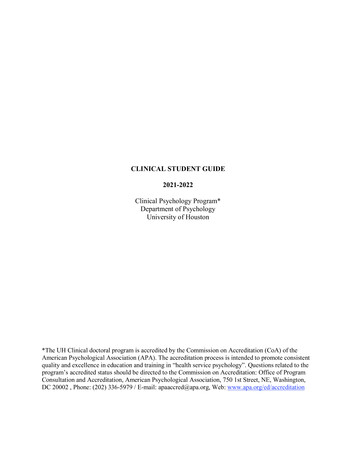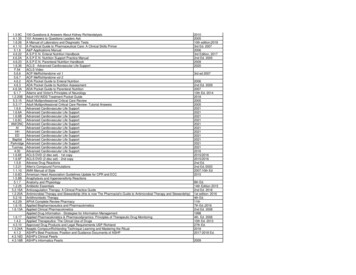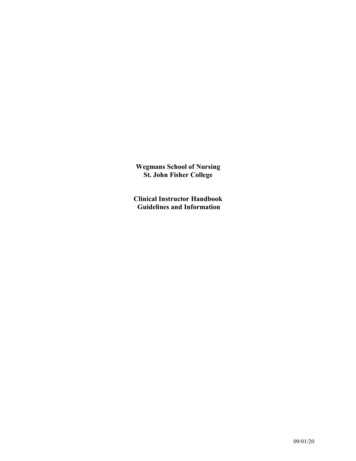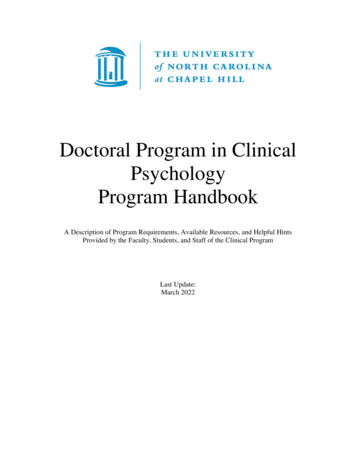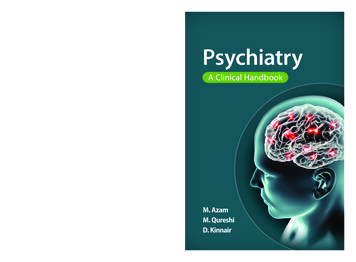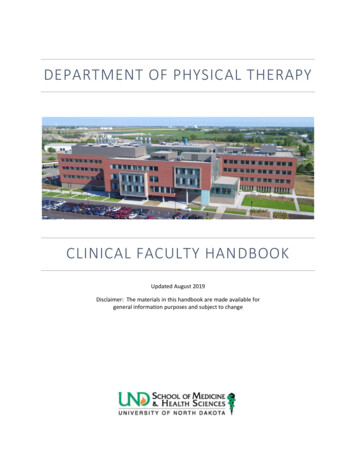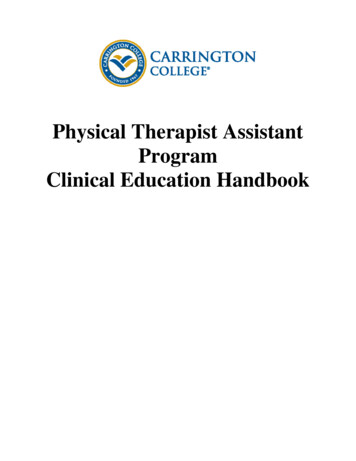
Transcription
Physical Therapist AssistantProgramClinical Education Handbook
INTRODUCTIONClinical education is an integral part of the education of the physical therapist assistant (PTA) student. While eachclinical affiliation has its own specific objectives, the overall objective of clinical education remains the applicationand integration of didactic abilities into the healthcare environment. Carrington College expects that each studentwill successfully translate concepts, knowledge, and skills acquired in program specific PTA courses. Clinicaleducation continues to be the preferred opportunity for PTA students to experience the reality of the clinic. Althoughcompetence can be achieved in the laboratory setting, true mastery can only be developed in clinical practice.Finally, clinical education provides each student with the opportunity to develop and validate their approach as apractitioner by having the ability to work directly with patients, supervisors, and in a variety of clinical situations.This handbook is designed to provide the clinical education faculty and students in the Carrington College PTAprogram with important information regarding the policies and procedures specific to clinical education.Clinical faculty and Carrington PTA students are encouraged to reference the Carrington College AcademicCatalog, Carrington College Student Handbook, Carrington College PTA Policy & Procedure Manual or contactthe Program Academic Coordinator of Clinical Education (ACCE) for further clarification on policies andprocedures that may not be fully covered in this handbook.FEATURESThe Appendix contains forms and referenced resources relevant to clinical education.Where applicable, policies and procedures are referenced to related college and/or programmaticdocuments.2
Table of ContentsCOMMON TERMS USED IN CLINICAL EDUCATION . 4CLINICAL EDUCATION POLICIES & PROCEDURES . 4STUDENT READINESS FOR CLINICAL EDUCATION. 6BACKGROUND CHECK AND MEDICAL CLEARANCE . 6SUPERVISION OF STUDENT PHYSICAL THERAPIST ASSISTANTS . 8CRITERIA FOR SELECTION OF CLINICAL INSTRUCTORS . 8ASSIGNMENT OF CLINICAL SITES . 9CLINICAL ATTENDANCE POLICY. 10STUDENT LIABILITY. 11RESPONSIBILITIES OF THE CLINICAL FACULTY & THE CLINICAL INSTRUCTOR . 12RESPONSIBILITIES OF CARRINGTON COLLEGE . 13RESPONSIBILITIES OF THE CLINICAL STUDENT . 13GUIDELINES FOR CLINICAL DRESS CODE . 14CONFIDENTIALITY IN CLINICAL EDUCATION . 15INFORMED CONSENT IN CLINICAL SETTINGS . 15INCIDENTS . 16CLINICAL FACULTY DEVELOPMENT . 16RIGHTS OF THE FACILITY & CLINICAL INSTRUCTOR . 16EVALUATION OF STUDENTS IN CLINICAL EDUCATION . 17PASSING A CLINICAL EDUCATION COURSE . 18CLINICAL EDUCATION DISCIPLINARY POLICY . 19DISMISSAL FROM A CLINICAL EDUCATION ROTATION . 20COMPLAINTS, GRIEVANCE & DUE PROCESS PROCEDURE . 20FAILURE OF A CLINICAL EDUCATION COURSE . 20CLINICAL SITE SUGGESTIONS & COMPLAINTS . 21APPENDICES . 22APPENDIX A: PHYSICAL EXAM FORM . 22APPENDIX B: HEPATITIS B DECLINATION FORM . 23APPENDIX C: CRITERIA FOR SELECTION OF CLINICAL INSTRUCTORS . 24APPENDIX D: CONFIDENTIALITY STATEMENT . 25APPENDIX E: STUDENT EVALUATION OF CI & SITE . 26APPENDIX F: CLINICAL EDUCATION DISCLOSURE FORM . 27APPENDIX G: CLINICAL SKILLS SCHEDULE . 28APPENDIX H: CONSENT FOR RELEASE OF INFORMATION . 30APPENDIX I: ACKNOWLEDGEMENT . 313
COMMON TERMS USED IN CLINICAL EDUCATIONAcademic Coordinator of Clinical Education (ACCE)/Director of Clinical Education (DCE) - TheCore Faculty member who has responsibility in the program for coordinating the clinical educationportion of the curriculum.Center Coordinator of Clinical Education (CCCE) – the clinical education manager/ organizer at eachclinic for student rotations.Program Director (PD) - The Core Faculty member who is designated as and has responsibility for themanagement of the PTA program. The Program Director is employed full-time by the institution thathouses the PTA program and typically has a faculty appointment.PTA Faculty - The persons employed to instruct courses in the PTA curriculum.Clinical Affiliation – One of three specific clinical education rotations. Students are supervised by alicensed physical therapist or physical therapist assistant and required to travel to the facility where theCI is employed.Clinical Education - the portion of the PTA curriculum where the student develops clinical skills byapplying didactic information in a clinical setting.Clinical Instructor (CI) - Licensed Physical Therapist or Physical Therapist Assistant who providesdirect supervision of the PTA student during the clinical learning experience. The CI is responsible forproviding an environment that fosters learning, supervision and constructive feedback.Clinical Performance Instrument (CPI) - The APTA’s Clinical Performance Instrument (CPI) will be usedto evaluate the student’s performance in PTA259 and PTA289 Clinical Education II and III. The studentwill complete the Evaluation of Clinical Experience and Clinical Instruction. The CI and the student willcomplete and review the CPI at midterm and at completion of the clinical affiliation.Competency - The minimum level of knowledge, skills, and behaviors necessary to progress in the PTAprogram, and to participate in a clinical education affiliation.Proficiencies - Psychomotor skills that are taught and assessed for minimal competency.On Site Supervision: The supervising physical therapist (PT) is on site and is present in the facility or onthe campus where assistive personnel or a holder of an interim permit is performing services, isimmediately available to assist the person being supervised in the services being performed andmaintains continued involvement in appropriate aspects of each treatment session in which a componentof treatment is delegated.CLINICAL EDUCATION POLICIES & PROCEDURESThe purpose of clinical education is to allow students the opportunity to apply knowledge and skillsacquired in the classroom and lab to a hands-on patient situation. The clinical experience is designed toprovide student learning experiences with patients, promote coordination with other healthcareproviders, develop a better understanding of common healthcare practices, improve communication, anddevelop time-management skills. These experiences will assist the student in correlating the academicknowledge attained with clinical practice. In summary, clinical education should allow the students to4
practice and apply new skills and concepts, expand the academic knowledge base, develop clinicalcompetencies, and develop communication and interpersonal skills needed to function as a health careteam member under the direction and supervision of a licensed physical therapist.Students will participate in three clinical experiences throughout the course of the program. ClinicalEducation I is sequentially placed within semester 4 of the technical phase of the PTA program and istherefore integrated into the didactic portion of the program. Clinical Education II and III are full-timeterminal experiences during the entire final semester of the program. Each student will be supervised bya licensed physical therapist at a facility affiliated with Carrington College. In order to assure a variety ofwork environments and exposure to different facilities, it is the policy that students are assigned to twodifferent settings for the terminal clinical experiences, based on clinical site availability. The ACCE willtrack the student placement to outpatient and inpatient facility via Assignment Tracker.Students are responsible for their own transportation to attend all assigned courses and clinicalrotations. Due to standards set by The Joint Commission, students with criminal histories may not beable to complete their clinical rotations. Carrington College cannot be responsible for finding an alternateclinical placement for a student who fails to pass the background check or drug screen. A student who isunable to complete the required clinical experience will be unable to complete the requirements for thePTA program and will be withdrawn.Clinical education experiences will not be scheduled in physical therapy departments in which a studentis or was employed, volunteered, or completed pre-admission observation hours. Because clinicaleducation experiences are a learning experience, the facility may not compensate the student in any way.Goals of Clinical Education Allow the student to practice and apply new skills and concepts.Expand the student’s academic knowledge base.Provide the student the opportunity to gain confidence with clinical skills and interpersonalcommunication.Develop effective communication, collaboration, and interpersonal skills needed to function as aprofessional educator and health care team member.Develop and refine the student’s clinical proficiency within the scope of physical therapy practice.Promote development of professional behaviors.Develop critical thinking and problem solving skills.Identify role models and an understanding of working under the supervision of a physical therapist.Identify personal areas of interest and/or need.Afford the student a wide variety of clinical environments and patient experiences so that the student maybecome a well-rounded, generalist health care provider.PROGRAM CONTACT INFORMATIONACCELaura Cerame, PTA, BS702-688-4142lcerame@carrington.eduProgram DirectorDanielle Mills, PT, DPT702-688-4317dmills@carrington.edu5
Clinical education assignments will be arranged by the ACCE from Carrington College in conjunction withthe affiliating clinical site. While the student is in the clinical department he/she must observe theregulations imposed by the affiliating clinical facility with regards to patient safety and welfare.The student must read the Clinical Education Handbook and Course Syllabus prior to clinicalinternship to become familiar with responsibilities, expectations, and other policies andprocedures.STUDENT READINESS FOR CLINICAL EDUCATIONThe course of study follows a hierarchical progression from rudimentary to complex academic andclinical experiences with the primary goal of graduating an entry-level PTA that is well educated, ethical,professional, and compassionate.Students must have successfully completed all PTA program didactic coursework, with the exception ofPTA 230 and PTA 223 for Clinical Education I, and be in good standing in the PTA program in order to bescheduled for clinical education courses. The student must be functioning at the developing level ofacademic professional behaviors prior to beginning all full-time clinical coursework. The faculty reservesthe right to require additional learning experiences as deemed necessary to promote a successful clinicallearning experience.Skills competencies checklists and practical examinations are incorporated into the PTA program toensure that students have achieved entry level skill and knowledge base for all therapeuticinterventions, and that they are consistently practicing all critical safety and communication elements.A student may only participate in a clinical experience once he/she has achieved a level of skillsproficiency commensurate with the objectives established in the program curriculum. The skillscompetencies checklists and practical examinations scores will be used to assess those levels ofproficiency. Additionally, a student may only participate in clinical experiences after successfullycompleting and passing all course grading assignments and activities required to pass courses that arescheduled prior to the clinical education experience.Students are required to score 100% on all critical s a f e t y elements and 80% on all skillscomponents of each competency prior to attending Clinical Education courses. All skills competencies fora particular course must be met before a student is issued a grade for that course.BACKGROUND CHECK AND MEDICAL CLEARANCELocated in the Carrington College Academic Catalog, BackgroundCheck http://carrington.edu/carringtoncollege/catalog/In addition to the institution’s Background Check Policy, students of the Carrington College PTA programare advised that hospitals and outpatient clinics typically require that students submit to a backgroundcheck and receive appropriate clearance before they will be permitted to participate in clinical rotationsat those institutions. Students who do not receive appropriate clearance may be unable to fulfill theiracademic requirements at Carrington College, and may not be able to complete their educationalprogram.6
To be considered eligible to attend any clinical education rotations for the PTA program at CarringtonCollege, all students are required to show documentation of the following:Background CheckThe background check must be completed at the time of the admission process. Failure to do so will result in anincomplete admissions packet and the applicant will be ineligible for entrance into the PTA program. A secondbackground check may also be required to be completed prior to the start of a Clinical Affiliationassignment per the specific affiliation agreement requirements for each site. Failure to do so will resultin and the student being ineligible for enrollment in Clinical Education courses. Each student will be givena background check information packet that he/she must complete on their own and submit toCarrington College. The background check website can be accessed at www.mystudentcheck.com. Eachapplicant is responsible for the cost which is 49.50.** There may be an additional requirement for a DES fingerprint clearance card, depending upon clinicalsite requirements in semesters four and five.Proof of immunization must be completed prior to beginning the technical phase of the program insemester three. Students are responsible for costs associated with this requirement.Medical Clearance RequirementsImmunizations: Mumps, Measles and Rubella: This requires two vaccinations or a titer showing immunity.Varicella (chicken pox): Must have a varicella vaccine or a titer showing immunity. The titer resultswill typically take up to seven days.Hepatitis B: This requires three vaccinations over six months or a waiver may be signed. The studentmust have completed at least two of the three vaccines in the series prior to starting clinical education.TB Screen: Two-step PPD/Tests will be completed on an annual basis prior to clinical placement at thestudent’s expense.Tdap or Diphtheria, Tetanus, and PertussisAdditional medical documentation, immunizations, and requirements may be required based on clinicalfacility requirements.Drug screen: Negative results from a urine sample for the follow substances. Amphetamine (AMP) Methadone (MAD) Barbiturate (BAR) Methamphetamine (MET) Benzodiazepines (BZD) Oxycodone (OXY) Cocaine (COC) Phencyclidine (PCP) Marijuana (THC) Propoxyphene (PPX)CPR: BLS American Heart Association Healthcare Provider certification. CPR must be completed as arequirement for admission into the PTA program.Proof of Health Insurance: Students are required to maintain their own health care coverage, at their owncost. Students may be required by some clinical facilities to have proof of health insurance prior tobeginning a clinical rotation.7
Physical Examination by a physician (SEE APPENDIX A)APTA POLICY ONSUPERVISION OF STUDENT PHYSICAL THERAPIST g/About Us/Policies/HOD/Practice/Supervision.pdfOn-site supervision is required for all clinical education experiences. Specific requirements include: When the student PTA is participating in the delivery of physical therapy services while being supervisedby the physical therapist alone or the PT and PTA working as a team, the PT or the PTA is physicallypresent and immediately available at all times.PTA students must be supervised via on-site supervision at all times during patient care.The PT or the PTA will have direct contact with the patient/client during each visit as visit is defined in theGuide to Physical Therapist Practice.The supervising PT may supervise any combination of graduates of physical therapy, students of physicaltherapy, physical therapist’s assistants and physical therapist’s technicians, a combined total of three suchpersons at the same time. The supervising physical therapist may not supervise more than:o Two physical therapist’s assistants at the same time.o Two physical therapist’s technicians at the same time.o Two students of physical therapy at the same time.o Two graduates of physical therapy at the same time.All patient treatment notes should be read, approved, and countersigned by the CI. All treatment notesshould be signed by the student with the words “Student Physical Therapist Assistant.”CRITERIA FOR SELECTION OF CLINICAL INSTRUCTORSIn order to ensure that students are receiving the best possible education, the Carrington College PTAprogram has developed minimum standards required for CIs supervising students in clinical experience(SEE APPENDIX C).1. Hold current Physical Therapist license or Physical Therapist Assistant licensure/certification in the statehe/she is practicing Physical Therapy services without reservation from the Nevada Board of PhysicalTherapy.2. Physical Therapist Assistants as clinical instructors will require supervision from a Physical Therapistand work collaboratively with the Physical Therapist3. Have at least one year’s clinical experience prior to assuming the role of the CI.4. Use and abide by the APTA document, “Guidelines and Self-Assessments for Clinical Education.”5. Have a regular patient load sufficient to provide the student(s) with an opportunity to apply knowledgeand increase skill in patient treatment.6. Be committed to high quality Physical Therapist Assistant student education and support the CarringtonCollege- Las Vegas Campus Physical Therapist Assistant Program.7. Express positive attitudes and willingness to work with the student(s) and faculty of Carrington CollegeLas Vegas Campus.8. Provide adequate supervision of patient interaction, treatment, and record keeping procedures performedby the student(s).9. Follow facilities system for maintaining records of patient evaluation, treatment, and progression.10. Express willingness to follow written agreement between the clinical facility and Carrington CollegeLas Vegas Campus.11. Abide by all applicable state and federal laws and appropriate professional codes of ethics.8
12. Follow Policies and Procedures of the Physical Therapist Assistant Program at Carrington College-LasVegas campus, the policies and procedures of the clinical site and the APTA Standards for EthicalConduct for Physical Therapist Assistant and Code of Ethics.13. Agree to use the APTA document the Clinical Performance Instrument (CPI) as a studentevaluation tool. (Training will be provided to the CI if he/she is unfamiliar or inexperienced withusing the CPI.)Each CI will be given a copy of the CI Selection Form outlining the minimal standards list. A signed copyof the form indicating the CI’s agreement with the standards will be maintained by the ACCE in theclinical faculty file.ASSIGNMENT OF CLINICAL SITESLocated in Catalog, Externships, Clinical Rotation, and Fieldwork, rrington College is committed to following the APTA Uniform Mailing Date, when possible, to inquireabout the availability of clinical sites for the upcoming student cohort. The ACCE will send the ClinicalRequests Form to affiliating clinical sites. When a completed form is received, the status of the writtenagreement and CI criteria will be reviewed. Students are assigned to a clinical site at least six weeks priorto the start of the affiliation. Under special circumstances, such as cancelled site availability, students willbe assigned as early as possible for continuity of the clinical experience.Clinical sites are chosen in the PTA program to meet the student’s need for a comprehensive educationand to meet the mission and goals of the program. In order to provide the variety, depth, andbreadth expected for the clinical experiences, students will typically be placed in at least two differentsettings. However, the determining factor for clinical placement is to ensure that the student is able tomeet all clinical educational goals through the clinical education experience. Student preferences will beconsidered during the placement process; however, the final determination rests with the ACCE.The ACCE will only place a student at a clinical site where: The college has a current affiliation agreement with the site.The CI meets all criteria for selection as a CI.The site is able to provide adequate supervision within the laws and regulations of supervisionof a student PTA.The ACCE is responsible for determining the clinical assignments for each student. Clinical placement isdesigned to provide the student with a variety of physical therapy experiences and facilitate theattainment of the basic skills needed for the practice of a physical therapist assistant. The program iscommitted to providing a clinical experience with the breadth and depth expected to ensureopportunities for the PTA student to graduate as a generalist in entry level PTA competency.Any questions or comments should be directed to the ACCE. Any refusal to take an assignment withoutjust cause will put the student at risk of being withdrawn from the PTA program. Student placements arereserved months in advance of a scheduled clinical experience. A student’s request for a change inassignments will be considered only if a situation warrants, which will be determined by the ACCE andthe Program Director. The student needs to understand that finding alternative placements are notalways possible once assignments have been made, and request for change may be denied. Once a clinical9
site has been confirmed, changes to the assignment will not be made other than in an emergent situation.Students will only be sent to facilities that have a current and valid contract with Carrington College.Clinical affiliations are available in the Las Vegas Metropolitan area as well as throughout the state ofNevada; however, a student may also request a clinical site in another location.Should one of the clinical facilities cancel their affiliation slot, the student who is involved in thecancellation will be notified and the ACCE will call additional facilities and request a slot. Graduationcould be delayed based on availability of clinical sites/placements.Each student is assigned to a specific clinical site. The student must contact the clinical site contactperson two weeks prior to the start of the internship. The purpose of the call is to introduce the studentconfirm the clinic hours and expected arrival time on the first day, dress code, directions to thedepartment, any specific parking requirements, etc.The student is required to adhere to his or her assigned clinical schedule. Any adjustment to expectedclinical schedule will be made between the ACCE and the CI. No personal adjustments may be madewithout notification and approval by the ACCE.CLINICAL ATTENDANCE POLICYLocated in the Carrington College Student Handbook, Clinical Hours & ooks/2014/2014-CC-student-handbook.pdfIn addition to the institution policy, PTA students are expected to be present for all clinical experiencesand to abide by the hours and policies of the assigned clinical facility.Students are responsible for reviewing the Attendance Policy and abiding all items in the Code of Conductsection of the Catalog. Clinical hours are full-time, 40 hours per week.Students are expected to be in their assigned clinical area at the clinical facility prepared to engage inpatient care a minimum of 10 minutes before the start of their “shift.” Failure to meet this requirementconstitute tardiness. Chronic tardiness will affect the student’s performance evaluation for the rotationand may result in disciplinary action.If a student is unable to attend, the clinical facility and ACCE must be notified each day of an absence by8:00 a.m. or upon opening. Absences must be documented as being due to illness or emergency. Thestudent will submit a “Clinical Affiliation Absence/Tardy Form” with the timesheet indicating the date,total hours missed, and reason for absence. Absences must be due to illness or emergency.Clinical attendance will be documented in the student's record. Changes in the clinical schedule,including make-up days must be coordinated and approved by the ACCE, CCCE, and CI.If a student does not report for a clinical experience as scheduled, the CI and the ACCE will counselthe student and this absence will be considered unexcused.Students will be allowed one sick day of clinical absence during Clinical Education I and three sick days ofabsence during Clinical Education II and III. Making up missed clinical education hours will bedetermined at the discretion of the ACCE, CI, and/or CCCE.10
All holidays observed by Carrington College may be considered holidays for students. Clinical sites thatobserve holidays that coincide with scheduled clinical days will also be regarded as holidays by thosestudents assigned to that facility.Students failing to comply with attendance requirements may receive a grade of ‘No Credit’ for theclinical experience and may be recommended for dismissal from the program.A release from a physician will be required to return to clinical following three (3) or more consecutivedays of absence due to illness/injury.Children may not attend the clinical experience with the parent.Before leaving the clinical site, the student must report to the CI.Clinical Attendance Process1.2.3.Timesheets are required to be submitted on Thursday before 5pm for that work week.Student’s hours are to reflect any breaks or lunch and the hours are to be totaled for each day.Students failing to comply with attendance requirements may be recommended for dismissalfrom the program.Any changes in the clinical schedule, including make-up days must be coordinated andapproved by the ACCE, CCCE and CI.TRANSPORTATIONStudents are responsible for their own transportation including all expenses incurred for transportation,parking, and living arrangements related to clinical affiliations.STUDENT LIABILITYAll students are covered by Carrington College’s umbrella liability insurance while on their clinicalaffiliations.DISABILITY ACCOMMODATION – CLINICAL EDUCATIONCarrington College adheres to the Americans with Disabilities Act, and will work with clinical facilities tomake every effort to provide reasonable accommodations for those students with disabilities.Documentation by a physician of a student’s physical performance limitations may be required toaccommodate requests.Students who are aware or suspect there is a situation that may interfere with their ability to complete therequirements of the clinical education courses and affiliation duties/responsibilities, must contact theACCE or Program Director. Appropriate actions
Clinical education is an integral part of the education of the physical therapist assistant (PTA) student. While each . and integration of didactic abilities into the healthcare environment. Carrington College expects that each student will successfully translate concepts, knowledge, and skills acquired in program specific PTA courses .

